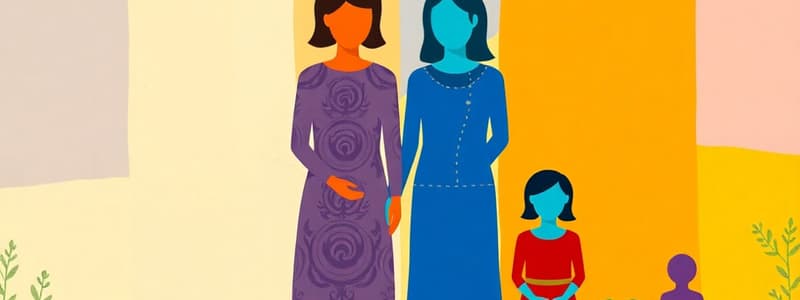Podcast
Questions and Answers
Which of the following is NOT typically considered a primary function of the family?
Which of the following is NOT typically considered a primary function of the family?
- Political lobbying (correct)
- Socialization
- Economic stability
- Procreation
In a matrifocal family, the father assumes the dominant role in household decisions and childcare.
In a matrifocal family, the father assumes the dominant role in household decisions and childcare.
False (B)
Identify two potential effects of the changing roles of men and women in modern society.
Identify two potential effects of the changing roles of men and women in modern society.
Increased female participation in the workforce; shifting expectations in household responsibilities.
A legally recognized marriage involving one spouse at a time is known as ______.
A legally recognized marriage involving one spouse at a time is known as ______.
Match the following social problems with their potential impact on society:
Match the following social problems with their potential impact on society:
Group cohesion is most likely to be enhanced by which of the following factors?
Group cohesion is most likely to be enhanced by which of the following factors?
Autocratic governments are characterized by power being concentrated in a single person or entity.
Autocratic governments are characterized by power being concentrated in a single person or entity.
Name two key functions performed by the judicial branch of government.
Name two key functions performed by the judicial branch of government.
A significant decline in the number of eligible voters participating in elections can be described as voter ______.
A significant decline in the number of eligible voters participating in elections can be described as voter ______.
Which of the following is a likely consequence of 'brain drain'?
Which of the following is a likely consequence of 'brain drain'?
Flashcards
Matriarchal Family
Matriarchal Family
A family where the mother holds the primary position of power and authority.
Matrifocal Family
Matrifocal Family
A family where the mother is the head of the family. The father may not be present in the home.
Patrifocal Family
Patrifocal Family
A family where the father is the head of the family. The mother may not be present in the home.
Patriarchal Family
Patriarchal Family
Signup and view all the flashcards
Alimony
Alimony
Signup and view all the flashcards
Crime and Violence
Crime and Violence
Signup and view all the flashcards
Sexually Transmitted Diseases (STDs)
Sexually Transmitted Diseases (STDs)
Signup and view all the flashcards
Separation of Powers
Separation of Powers
Signup and view all the flashcards
First Past the Post
First Past the Post
Signup and view all the flashcards
Death Rate
Death Rate
Signup and view all the flashcards
Study Notes
- Families exist to procreate, socialize children, provide economic support, and educate members
- Family structures vary, each with its own pros and cons depending on specific needs and situations
- Key family terms include matriarchal (female-dominated), matrifocal (female-centered), patrifocal (male-centered), and patriarchal (male-dominated)
Gender Roles
- Evolving roles of men and women are driven by various factors, producing diverse social impacts
- Shifts in gender roles consequently influence societal norms, expectations, and opportunities for both genders
Preparing for Parenthood
- Preparing for parenthood involves acquiring skills, knowledge, and resources to raise healthy, well-adjusted children
- Effective parenting employs strategies promoting positive development, discipline, and communication
Family Unions
- Family unions include visiting relationships, same-sex partnerships, common-law arrangements, and legal marriages
- Marriage, when legally recognized, can take forms like monogamy (one partner) or polygamy (multiple partners)
- Legal aspects of marriage encompass concepts such as alimony (financial support after divorce) and divorce (legal termination of marriage)
Social Problems
- Social problems like drug abuse, crime, STDs (including AIDS), juvenile delinquency, suicide, and domestic violence impact individuals and communities
- These issues often require multi-faceted solutions involving prevention, intervention, and support
Culture
- Culture encompasses shared beliefs, values, customs, and traditions shaping a group's identity and way of life
- Cultural traditions reflect a society's history, heritage, and practices passed down through generations
Groups
- Groups can be categorized by shared interests, voluntary association, or other commonalities
- Group cohesion, influenced by various factors, affects how well a group functions and achieves its goals
- Institutions are established structures and organizations that govern behavior and meet societal needs
Government
- Government systems range from democracies to autocracies, each differing in power distribution
- Democratic governments, characterized by specific principles, exist in various forms in the Caribbean (British Overseas Territories, Republicanism, Constitutional Monarchy)
Branches of Government
- Government branches have distinct functions, and the Head of State plays a role
- The process of passing a bill involves specific steps and procedures
- Human rights are fundamental entitlements inherent to all individuals
- Judicial systems interpret and apply laws, ensuring justice and resolving disputes
Electoral Systems
- Electoral systems include "First Past the Post" and Proportional Representation, each affecting election outcomes differently
- Voter turnout is influenced by factors; voter apathy, is a concern in democratic processes
Population
- Population dynamics involve birth rates, overpopulation, population density, and underpopulation
- These factors impact resource availability, environmental sustainability, and economic development
Developing Human Resources
- Developing human resources involves investing in education, healthcare, and skills training
- Primary health care is essential for a productive and healthy labor force
Migration
- Migration is influenced by push and pull factors, including urban-to-rural movement and brain drain
- Brain drain (emigration of skilled workers) can have consequences on the sending country
Studying That Suits You
Use AI to generate personalized quizzes and flashcards to suit your learning preferences.




